九年级英语情态动词最全版讲解.
初三英语中考语法一轮复习讲义(二十八)should,ought to,had better,have to最全用法总结与整理
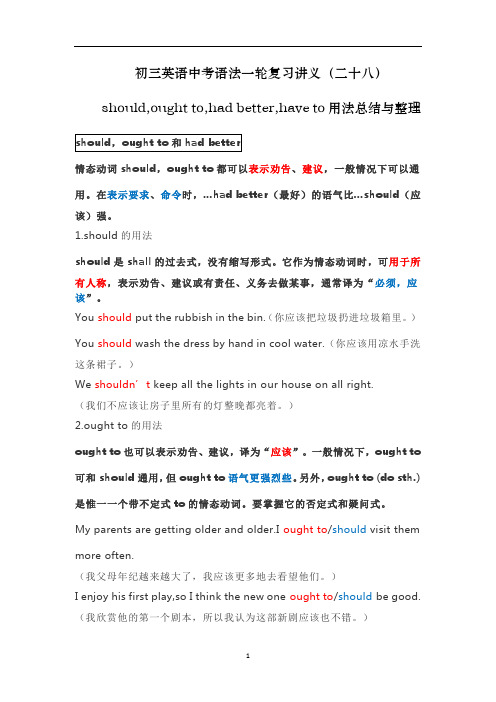
初三英语中考语法一轮复习讲义(二十八)should,ought to,had better,have to用法总结与整理should,ought to和had better情态动词should,ought to都可以表示劝告、建议,一般情况下可以通用。
在表示要求、命令时,...had better(最好)的语气比...should(应该)强。
1.should的用法should是shall的过去式,没有缩写形式。
它作为情态动词时,可用于所有人称,表示劝告、建议或有责任、义务去做某事,通常译为“必须,应该”。
You should put the rubbish in the bin.(你应该把垃圾扔进垃圾箱里。
)You should wash the dress by hand in cool water.(你应该用凉水手洗这条裙子。
)We shouldn’t keep all the lights in our house on all right.(我们不应该让房子里所有的灯整晚都亮着。
)2.ought to的用法ought to也可以表示劝告、建议,译为“应该”。
一般情况下,ought to 可和should通用,但ought to语气更强烈些。
另外,ought to (do sth.)是惟一一个带不定式to的情态动词。
要掌握它的否定式和疑问式。
My parents are getting older and older.I ought to/should visit them more often.(我父母年纪越来越大了,我应该更多地去看望他们。
)I enjoy his first play,so I think the new one ought to/should be good. (我欣赏他的第一个剧本,所以我认为这部新剧应该也不错。
)1.have to的肯定句句型:主语+have/has/had/will have to+动词原形+……We have to stay there for three hours.(我们不得不在那儿呆上3个小时。
Unit+1+情态动词need和should+++单元语法讲义-冀教版英语九年级全册
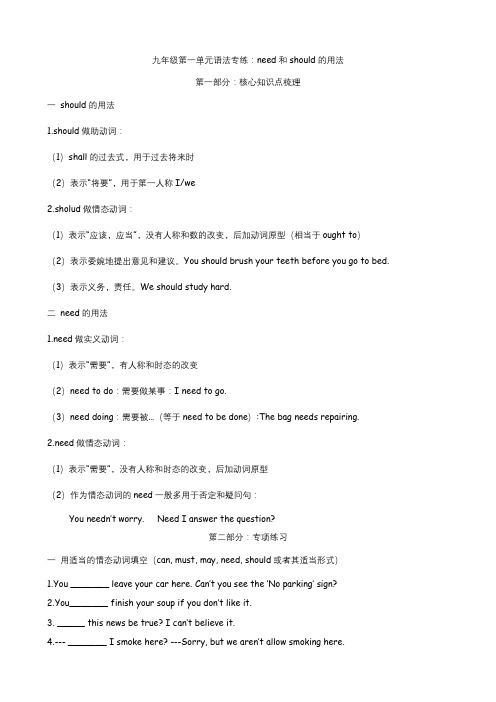
九年级第一单元语法专练:need和should的用法第一部分:核心知识点梳理一should的用法1.should做助动词:(1)shall的过去式,用于过去将来时(2)表示“将要”,用于第一人称I/we2.sholud做情态动词:(1)表示“应该,应当”,没有人称和数的改变,后加动词原型(相当于ought to)(2)表示委婉地提出意见和建议。
You should brush your teeth before you go to bed. (3)表示义务,责任。
We should study hard.二need的用法1.need做实义动词:(1)表示“需要”,有人称和时态的改变(2)need to do:需要做某事:I need to go.(3)need doing:需要被…(等于need to be done):The bag needs repairing.2.need做情态动词:(1)表示“需要”,没有人称和时态的改变,后加动词原型(2)作为情态动词的need一般多用于否定和疑问句:You needn’t worry. Need I answer the question?第二部分:专项练习一用适当的情态动词填空(can, must, may, need, should或者其适当形式)1.You _______ leave your car here. Can’t you see the ‘No parking’ sign?2.You_______ finish your soup if you don’t like it.3. _____ this news be true? I can’t believe it.4.--- _______ I smoke here? ---Sorry, but we aren’t allow smoking here.5.He_______ be the actor, I have seen him on TV.6.I think today’s children_______ learn to respect their elders.7.She_______ swim, but I can’t.8.She said she_______ retire, but she was not sure.9. The clothes _______ washing, they look so dirty.10.You _______ push, there is a lot of room on the bus.二选择( ) 1.We_______build our country into a country of peace and wealth.A mightB shouldC could( ) 2.Dogs _______ run through soccer games at the park. It’s dangerous.A shouldB shouldn’tC needD needn’t( ) 3.To keep children safe, we_______ put the things like knives medicine away in our house.A mayB shouldC canD might( ) 4.Now most young people like shopping online because they_______ spend a lot of time going from shop to shop.A needn’tB can’tC mustn’tD shouldn’t( ) 5.In order to speak English better, we_______ be afraid of failure.A shouldB shouldn’tC have toD could( ) 6.Let’s take a bus, little children _______ tickets.A needn’t buyB needn’t to buyC don’t need buyD needn’t buying( ) 7. —It nearly took me an hour to walk here.—Have a drink, then. You_______be thirsty.A. mustB. shouldC. can( ) 8.—Do you have any plans about this summer vacation?—I_______go to Australia for vacation, but I haven’t decided yet.A. can’tB. mustC. may( ) 9.Please don’t make so much noise. I _______hear what the speaker is saying.A. needn’tB. mustn’tC. can’t( ) 10.—Excuse me, is this the way to the cinema?—Sorry, I’m not sure. But it _______be.A. mustn’tB. mightC. can’t( ) 11.—Mom, must I stay there the whole day?—No, you _______.You _______come back after lunch, if you like.A. mustn’t; canB. needn’t; mustC. needn’t; may( ) 12.—Is that Lucy’s car?—It _______be hers. She has just gone for a meeting.A. can’tB. shouldC. mustn’t( ) 13---Tom, do n’t drive too fast, you _________ hit the others’ cars. ---OK.A.may B.need C must D.have to( ) 14---Must I hand in all my money, Mum?---No, you _________. You can use it to buy some school things.A.mustn’t B.can’t C.needn’t D.should( ) 15---Susan, would you like to go hiking with us this afternoon?---I’d love to, but I _________ study for a test.A.may B.can C.will D.have to三句型1.I must go home now, it’s too late.(变为否定句)___________________________________2.I think he must be an engineer.(变为否定句)___________________________________3.You should finish your homework first.(否定句)___________________________________4.---Need I do the things right now?(做出肯否回答)---________,________ ________.(肯定回答)---________,________ ________.(否定回答)5.-- May I smoke here?---________,________ ________.(否定回答)。
Unit7情态动词表示推测语法知识清单人教版九年级英语全册
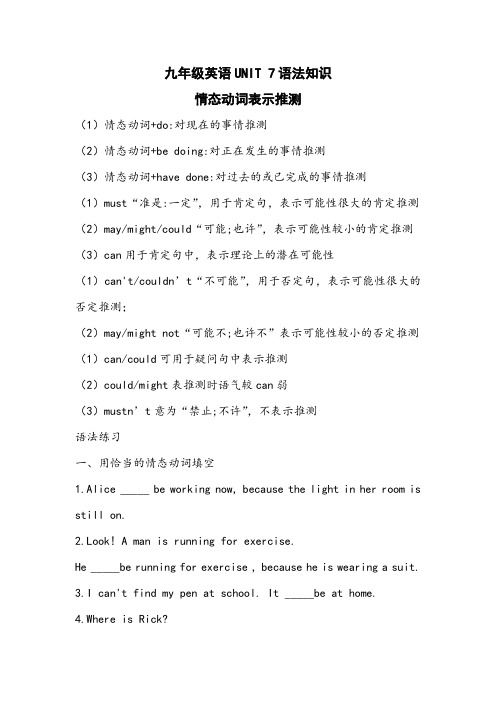
九年级英语UNIT 7语法知识情态动词表示推测(1)情态动词+do:对现在的事情推测(2)情态动词+be doing:对正在发生的事情推测(3)情态动词+have done:对过去的或已完成的事情推测(1)must“准是:一定”,用于肯定句,表示可能性很大的肯定推测(2)may/might/could“可能;也许”,表示可能性较小的肯定推测(3)can用于肯定句中,表示理论上的潜在可能性(1)can't/couldn’t“不可能”,用于否定句,表示可能性很大的否定推测;(2)may/might not“可能不;也许不”表示可能性较小的否定推测(1)can/could可用于疑问句中表示推测(2)could/might表推测时语气较can弱(3)mustn’t意为“禁止;不许”,不表示推测语法练习一、用恰当的情态动词填空1.Alice _____ be working now, because the light in her room is still on.2.Look! A man is running for exercise.He _____be running for exercise , because he is wearing a suit.3.I can't find my pen at school. It _____be at home.4.Where is Rick?He_____be in the classroom. I am not sure.5.The red truck_____ be Tom's. His is blue.二、单项填空。
( )6.(2023 广东中山一模)Look! The light in Lucy's office is still on. She _____ be working there.It _____be her. She has gone to Guangzhou on business.A. must; can'tB.can; mustn'tC.must; mustn'tD.may; needn’t( )7. Let's climb to the top of the mountain if you are not tired , shall we?You _____be kidding! I am afraid of high places!( )8.(2021 广东广州阶段练习)Mum,there is a beautiful box. What's in it?I’m not sure. It _____be a present from your aunt.( )9.(2022 广西玉林)Hey, whose basketball do you think this is?It _____belong to Linda. She likes playing basketball best in our class.A..mustB.canC. mustn'tD.can't( )10.(2022广西贵港期末)Where is Linda?I'm not sure. She _____in the school library.could be B.must be C.can't be D.will be( )11.(2022 广西贵港二秩)Smoking is not allowed in the forest. It ________kill animals and even people.A.needB.shouldC.mightD.can't( )12.(2022 四川成都开学考试改编)I think Dale is at home. be at home.He_____ be at home. He phoned me at the airport five minutes ago.A. might notB.mustn'tC.can'tD.needn't( )13.Whose notebook is it? Is it your partner's?No. It_____be hers. The handwriting is not so good as hers.A. mustn'tB.can'tC.couldn'tD. might not( )14.What do you think of this problem, Susan?It _____be very difficult. Even the top students can't solve it.( )15.(2022 甘肃甘南政编)Is that Jack over there?It_____ be him. He is having a piano lesson now.can't B. might not C.must D.could not( )16. Young boys should not _____to drive motorbike. It's dangerous.B.be allowingC.be allowed( )17. The old people must _____wellok aftere looked afterC. be looking afterD. looked after( )18. The sports meeting_____ on December 19th next term.A. HeldB.is heldC. will be held( )19. The seacrossing bridge _____in 2026.A.is pletedB.was pletedC. will be pleted( )20. All the teachers_____ to the party next week.will be invited B.will invite C.were invited三、用适当的情态动词补全下面短文。
人教版英语九年级全册Unit4(难点透视):情态动词would和used to的用法区别

情态动词would和used to的用法区别1. would 和used to都表示过去的习惯行为,意思为:过去常常。
would 表示过去某时间的意志、愿望和决心。
如:He would come to have a chat with us when he was free.他有空时,常会过来跟我们聊天He used to live in a cottage near the river. 他过去常住在河边的一座小木房里。
2. would 往往强调过去的一种可能性,而不暗示现在的情况;而used to强调过去常这样干,而现在不干了, 强调今惜对比。
如:He would sit there alone, thinking. 他会独自一人坐在那儿思考。
He used to swim in the river in summer. 夏天他常常在这条河里游泳。
3. would 作will的过去式,表示过去的一种意愿或将要做的事情,意思为:将会。
而used to无此意义。
如:People would go to ask him for advice when they came into trouble. 人们碰到麻烦事,就会去问他解决的办法。
4. would有时也可用来指现在,表示一种委婉、客气的请求,对于用它来提问题的回答,须用will,不能用would。
而used to无此意义及用法。
如:Would you please help me with this case? 请帮助我提一下这个箱子好吗?Yes, I’d like to. / I will. 好,我非常乐意。
5. would一般接表示动作的动词,不能与表示状态或情感、意识方面的词连用,而used to无此限制。
如:He would get here at eight. 他在八点会到这儿来。
He used to be / get here at eight. 他过去常在八点来这儿。
中考英语情态动词、助动词、系动词专项讲解
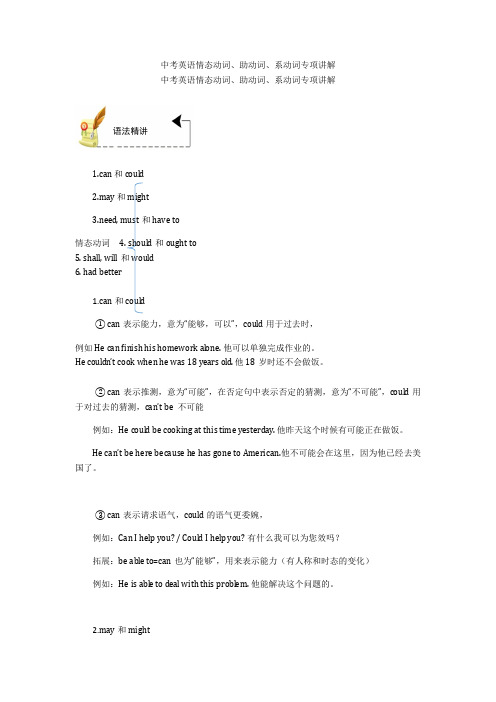
中考英语情态动词、助动词、系动词专项讲解中考英语情态动词、助动词、系动词专项讲解语法精讲1.can 和could2.may 和might3.need, must和have to情态动词 4. should和ought to5. shall, will和would6. had better1.can和coul d① can表示能力,意为“能够,可以”,could用于过去时,例如He can finish his homework al one. 他可以单独完成作业的。
He couldn’t cook when he was 18 years old. 他18岁时还不会做饭。
② can表示推测,意为“可能”,在否定句中表示否定的猜测,意为“不可能”,could用于对过去的猜测,can’t be 不可能例如:He could be cooking at this time yesterday. 他昨天这个时候有可能正在做饭。
He can’t be here be cause he has gone to American.他不可能会在这里,因为他已经去美国了。
③ can表示请求语气,coul d的语气更委婉,例如:Can I help you? / Coul d I help you? 有什么我可以为您效吗?拓展:be abl e to=can也为“能够”,用来表示能力(有人称和时态的变化)例如:He is able to d eal with this problem. 他能解决这个问题的。
2.may和 might① may表示请求,might语气更委婉,例如:May I help you?Might I sit here?② may表示肯定的推测,语气比can更弱,might对过去的推测例如:Mary may be doing her homework now.May can be doing her homework now. can表达的推测语气比may更强,更有把握。
第十三单元英语九年级知识点
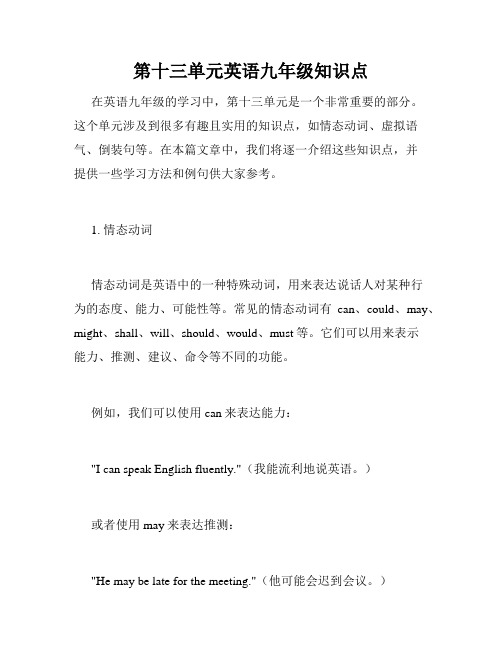
第十三单元英语九年级知识点在英语九年级的学习中,第十三单元是一个非常重要的部分。
这个单元涉及到很多有趣且实用的知识点,如情态动词、虚拟语气、倒装句等。
在本篇文章中,我们将逐一介绍这些知识点,并提供一些学习方法和例句供大家参考。
1. 情态动词情态动词是英语中的一种特殊动词,用来表达说话人对某种行为的态度、能力、可能性等。
常见的情态动词有can、could、may、might、shall、will、should、would、must等。
它们可以用来表示能力、推测、建议、命令等不同的功能。
例如,我们可以使用can来表达能力:"I can speak English fluently."(我能流利地说英语。
)或者使用may来表达推测:"He may be late for the meeting."(他可能会迟到会议。
)2. 虚拟语气虚拟语气是用来表达与现实事实相反或与过去相反的假设情况。
在使用虚拟语气时,我们需要注意动词的形式,如should、were、had、would等。
例如,在表示与现实情况相反的假设时,我们可以使用虚拟语气来表达:"If I were you, I would study harder."(要是我是你,我会更努力学习。
)在表示与过去相反的假设时,我们可以使用虚拟语气来表达:"He wished he had taken the job."(他希望他曾接受了这份工作。
)3. 倒装句倒装句是英语中常见的语法结构之一。
它的特点是主语和谓语的语序颠倒。
在一般疑问句和以never,not only...but also等词开头的句子中,需要使用倒装结构。
例如,在一般疑问句中,我们需要将助动词放在主语前面,改变句子的语序:"Do you like English?"(你喜欢英语吗?)在以never开头的句子中,我们需要将助动词放在主语前面,并且将其与主谓部分隔开:"Never have I seen such a beautiful sunset."(我从未见过如此美丽的日落。
九年级人教版英语情态动词用法总结(完整)及解析

九年级人教版英语情态动词用法总结(完整)及解析一、选择题1.-Do you mind telling me how to use this function? - . It’s easy. Just double-click on the “Pencil” icon.A.No, not at all B.Of course, I doC.Yes, I do D.Yes, I don’t2.—Are you going to offer some masks and alcohol wet wipes (酒精湿巾) to the people in the village?—________ They are in great need of these things.A.What a shame! B.Why not? C.Why me? D.What's wrong? 3.—I plan to find a part-time job in the coming summer holiday.—________ It will be a totally different experience.A.See you later. B.You’d better not.C.I’m sorry to know that.D.That sounds like fun.4.— I find it difficult to fall asleep before exams. Could you help me?— ___________. We have helped many students with similar problems.A.No problem B.Come on C.Well done D.What a pity 5.—I’m afraid I can’t get good grades in the P.E. exam.—________! Train as much as you can.A.Well done B.Keep trying C.Enjoy yourself D.Be careful 6.— I am so sorry to keep you waiting for such a long time.— ________.A.Please shut up B.It’s your mistake C.It doesn’t matter D.Don’t explain it 7.—I’m afraid I can’t do well in the sports meeting. I might let my classmates down.—_______. You don’t need to push yourself too hard.A.It’s a pleasure B.What a pity C.Take it easy D.Y ou’re welcome 8.—Amazingly, I've managed to finish the project by myself.—___________I told you it was easyA.With pleasure. B.Guess what? C.There you are! D.It doesn’t matter 9.–This box is too heavy for me to carry upstairs.–__________A.You may ask for help B.I’ll give you a handC.Please do me a favor D.I’d come to help10.—I’m sorry. That wasn’t of much help.— ________. In fact, it was most helpful.A.Thanks anyway B.It doesn’t matter C.Of course not D.Sure it was 11.—It’s been a wonderful p arty. Thank you very much?—- ________________.A.With pleasure B.No , thanks C.It’s OK D.I’m glad you enjoyed it .12.—Liz, I’d like to take a week’s holiday.—________. We’re as busy as a bee.A.Go ahead B.With pleasure C.Forget it D.That’s right 13.— What do you think of the movie Mr. Bea ?—____. It’s very funny.A.I can’t stand it .B.I don’t mind it C.I love it. D.I hate it. 14.—Don’t forget to keep safe distance (距离) at least one meter, Mike!—________A.Sorry, I won’t.B.No, I can’t do it.C.Not at all. D.I hope not. 15.—Lucy, can you help me with my history?—________. I am good at it.A.With pleasure B.I’m afraid not C.Sorry, I can’t D.No way 16.—I have got a new job as a presenter in the Wenzhou Radio Station!—________.A.Come on B.Good idea C.Congratulations D.All right 17.—TV says there will be a heavy rain tomorrow.—________. I planned to go climbing with my friend.A.Bad luck B.I hope so C.Good idea D.I don’t mind 18.—Do you like cartoons or scary movies?—_______. They can cheer me up.A.Yes, I do B.No, I don't C.Cartoons D.Scary movies 19.—You seem so happy today, Jack.—________? I won the first prize in the singing competition yesterday.A.So what B.How come C.Guess what D.Why not 20.—Susan, will you please go and empty that drawer?— _________ ?A.What for B.What is it C.How is it D.How come 21.—I’m going hiking this afternoon. Would you like to go with me?—______, but I must finish my homework first.A.Sorry, I don’t B.That’s right C.I’d love to D.Not at all 22.—Jim seems to be in low spirits. ________?—No one liked his plan. All his efforts were useless.A.Guess what B.What about him C.So what D.What happened 23.—________. Where’s the nearest supermarket?—Oh, it’s about 300 meters away, next to a park.A.Thank you B.Excuse me C.Come on D.That’s OK 24.—Anna, can you come to my party tomorrow night?—_________, but I have to stay at home because of the flu.A.I’d love to B.Sounds good C.That’s OK D.Why not 25.-Do you think the rain will stop tomorrow?-_____. It has rained for four days. It’s too wet everywhere.A.I hope not B.I don’t think soC.Don’t worry D.I hope so26.—I’ll have a chemistry exam tomorrow.—________!A.Well done B.Congratulations C.You’re welcome D.Good luck 27.—Would you mind if I open the window?—_______.We need fresh air.A.Not at all B.Yes, of course C.You’d better not D.That’s all right 28.—I find it really unwise to go travelling during May Day holiday.—________! Wherever you go, it’s crowded with cars and people.A.Not exactly B.Forget it C.You said it D.It depends 29.—Only those who have a lot in common can get along well.—________ Opposites sometimes attract.A.I think so. B.I don’t think so.C.I don’t care.D.I hope so. 30.—Only those who have a lot in common can get along well.—________. Opposites sometimes attract.A.I think so B.I don’t think so C.I don’t care D.I hope so 31.— May I have a look at the newspaper China Daily?— Certainly. ________A.Thank you. B.It’s a pity.C.Here you are. D.I’d like to. 32.—Hi, everybody! Here is the music.—________. Let’s dance to the music.A.That’s no good B.Here we go C.That’s a shame D.Have a good time 33.— Do you think Steve will pass the exam this time?— ________! He spends most of his time playing games on the phone.A.Promise B.No way C.Well done D.No problem 34.—________!—Yes. It sounds gentle and relaxing.A.How good the vegetable soup is B.How exciting the storybook isC.What nice music Ann is playing D.What a beautiful flower Jim keeps 35.—How about buying that coat?—________. It’s too expensive. I can’t afford it.A.That sounds good B.No way C.Good idea D.What a pity 36.—I wonder if Tenny is doing well in her new school.—________. She is old enough to look after herself well.A.You’re welcome B.Good luck C.It’s a pity D.No need to worry 37.—Our family will go to Hangzhou for a holiday this summer.—________.A.Well done B.I am glad to hear thatC.Best wishes to you D.Have fun38.— Wow, what a good smell! Can I have a piece of cake?— ________A.No way. B.Good idea! C.HeIp yourself. D.What a pity! 39.—Can you tell me how to get to the park?—________—Thank you all the same.A.Show me the map, please.B.Certainly. It’s opposite the museum.C.Sorry, I don’t know. I’m a stranger here.D.Sure. Turn right and go along Rock Road.40.— Would you mind my turning on the TV? The New Year concert has just begun.— ________. Just go ahead.A.Please don’t B.Better not C.Of course not D.I’m afraid not 41.—I prefer to chat online. I’ve got to know many friends on the Internet.—________. Few of them would become your real friends.A.I can’t agree more B.I’m pleased to know thatC.That’s for sure D.That’s not the case42.—We’ll study in different schools next term. I hope you’ll enjoy your time in the new school!—________A.I’ll take your advice. B.The same to you. C.Congratulations!D.It doesn’t matter.43.— The movie Lost in Russia sends a message about the importance of family.— ________. It reminds me of my parents.A.I hope so B.That’s all right C.You bet D.I don’t think so 44.—Michael was late for Mr. Smith’s ch emistry class this morning.—________? As far as I know, he never came late to class.A.So what B.Why not C.How come D.Who cares 45.— Are you feeling any better now after taking the medicine?—________. I’m feeling even worse.A.You got it B.Never mind C.Sorry to hear that D.Quite the opposite 46.— I guess you want to play tennis in the park this afternoon.—_______. That’s exactly what I was thinking just now.A.It’s up to you B.Of course not C.You read my mind D.It’s hard to say 47.—Can I look at the menu for a few more minutes before I decide?—Of course. ________, Sir.A.Make yourself at home B.Enjoy yourself C.It doesn’t matterD.Take your time48.—I’m so sorry to keep you waiting for me so long.— ________!A.With pleasure. B.Don’t say so C.I don’t think so D.It doesn’t matter 49.—I just got a message from Ms. Yang and she said she would come to our meeting this afternoon.— She always has good ideas.A.Why not? B.What a pity! C.Time is up. D.That’ll be very nice. 50.—I’ll be away on a busin ess trip. Would you mind looking after my cat?—Not at all. ________.A.It’s my pleasure B.I’d rather not.C.I’d like it.D.With pleasure.【参考答案】***试卷处理标记,请不要删除一、选择题1.A【解析】本题考查的是情景反应.根据意思可知答案为A解析:A【解析】本题考查的是情景反应.根据意思可知答案为A2.B【详解】句意:——你准备给村里的人提供口罩和酒精湿巾吗?——为什么不呢?他们非常需要这些东西。
情态动词表推测的讲解及练习题

九年级英语表推测语气的讲解与练习表推测时,英语中只使用must,may,might,may not和can't。
这五个表达的语气依次递减:情态动词must, can, could, may, might表推测的用法情态动词中的must, can, could, may, might都表推测。
其中must的可能性最大,can / could次之,may / might最小。
具体用法如下:1.must的用法(1)表示推测“可能性”时,意思是“一定、准是”,语气较肯定,较有把握。
He must be American. = It is certain that he is American. 他准是个美国人。
(2)must表推测只能用于肯定句。
如果要表示“一定不、肯定不”的意思时,应用can’t,如询问某种可能时,应用can。
He must know my address. 他肯定知道我的地址。
(一定)He can’t know my address. 他肯定不知道我的地址。
(一定不)Can he know my address? 他知道我的地址吗?(询问可能性)(3)must表示推测时,可以推测现在/正在发生的动作/过去发生的动作。
He must have a car now. (现在)他一定有辆小汽车。
He must be doing his exercises in the classroom.(正在进行)他一定在教室里做练习。
He must have finished the work.(过去发生)他一定已完成了工作。
注:must表示推测时很少用于将来的情况。
一般不用He must come tomorrow.可用It`s certain / I’m sure that he will come tomorrow.(4)在反意疑问句中,当附属部分含有表示推测意义的must时,疑问部分的助动词应与must 后面的动词在非推测情况下的用法保持一致。
情态动词英语语法讲解

情态动词英语语法讲解情态动词英语语法讲解本文题目:高考英语语法复习讲解:情态动词英语语法讲解根据以往英语取得高分同学的经验和海文英语辅导名师的建议,他们都一致认为英语语法和词汇是学好、考好英语的重要基础,其实完形填空是对语法、词汇的综合考查,但更关键的是学好此部分有助于对英语句子结构的分析和理解,有助于学生掌握灵活多变的句式,这样不仅有助于学生做好阅读理解,而且有助于学生做好英译汉,写好作文。
因此,我们在此编写了有关重点语法的知识点,并将陆续登出,同时将刊登一些试题。
希望同学们认真掌握,切不可因不靠它们而忽视了对英语基础知识的掌握。
(一)情态动词一.情态动词的现在完成式的用法情态动词现在完成式主要有两个功能:表示已经发生的情况和表示虚拟语气。
在这两个方面must/mustn’t,;can/cann’t;need/needn’t;may/mayn’t;might/ mightn’t;should/shouldn’t;ougtht等情态动词+完成式表示的意思是有一定区别的1.表示已经发生的情况。
1)musthave+过去分词,表示对已发生情况的肯定推测,译为“(昨天)一定……”。
如:MypainapparentthemomentIwalkedintotheroom,forthefirstman Imetaskedsympathetically:”Areyoufeelingallright?”[A]mustbe[B]hadbeen[C]musthavebeen[D]hadtobe(答案为C)2)can’t/couldn’thave+过去分词,表示对已发生情况的否定推测,译为“(昨天)一定没……”。
如:Marymyletter;otherwiseshewouldhaverepliedbeforenow.[A]couldn’thavereceived[B]oughttohavereceive d[C]hasreceived[D]shouldn’thavereceived(答案为A)3)may/mighthave+过去分词,表示对已发生的事情做不肯定、可能性很小的推测,或事实上根本没发生,译为“也许……”。
初中英语情态动词专项语法讲解
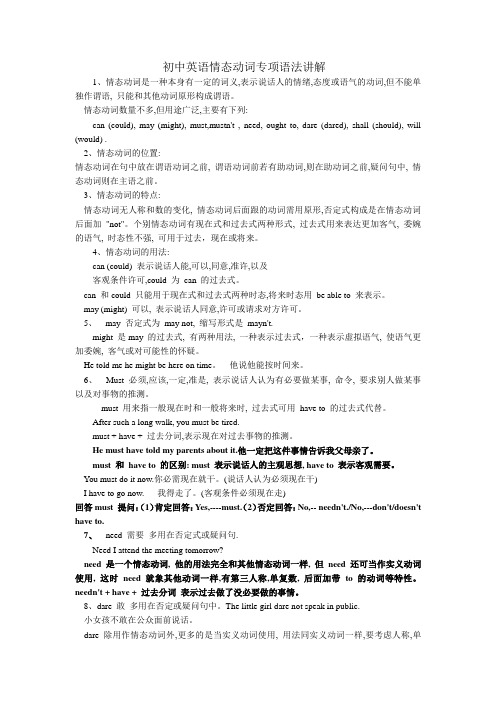
初中英语情态动词专项语法讲解1、情态动词是一种本身有一定的词义,表示说话人的情绪,态度或语气的动词,但不能单独作谓语, 只能和其他动词原形构成谓语。
情态动词数量不多,但用途广泛,主要有下列:can (could), may (might), must,mustn't , need, ought to, dare (dared), shall (should), will (would) .2、情态动词的位置:情态动词在句中放在谓语动词之前, 谓语动词前若有助动词,则在助动词之前,疑问句中, 情态动词则在主语之前。
3、情态动词的特点:情态动词无人称和数的变化, 情态动词后面跟的动词需用原形,否定式构成是在情态动词后面加"not"。
个别情态动词有现在式和过去式两种形式, 过去式用来表达更加客气, 委婉的语气, 时态性不强, 可用于过去,现在或将来。
4、情态动词的用法:can (could) 表示说话人能,可以,同意,准许,以及客观条件许可,could 为can 的过去式。
can 和could 只能用于现在式和过去式两种时态,将来时态用be able to 来表示。
may (might) 可以, 表示说话人同意,许可或请求对方许可。
5、may 否定式为may not, 缩写形式是mayn't.might 是may 的过去式, 有两种用法, 一种表示过去式,一种表示虚拟语气, 使语气更加委婉, 客气或对可能性的怀疑。
He told me he might be here on time。
他说他能按时间来。
6、Must 必须,应该,一定,准是, 表示说话人认为有必要做某事, 命令, 要求别人做某事以及对事物的推测。
must 用来指一般现在时和一般将来时, 过去式可用have to 的过去式代替。
After such a long walk, you must be tired.must + have + 过去分词,表示现在对过去事物的推测。
英语情态动词的基本用法

英语情态动词的基本用法英语情态动词的基本用法情态动词的使用一般是英语学习中的重点,以下是小编整理的英语情态动词的基本用法,欢迎参考阅读!一、情态动词的基本用法1. can基本含义与用法(1)(表示能力)能……;会……,(2)(表示可能、许可)能够……;可以,(3)(表温和的命令)请做……;得……,(4)(用于疑问句中,表请求、提议)能不能……;要不要…,(5)(用于疑问句中,表惊讶、怀疑等)“(到底)可能有这样的事吗?”,(6)构成特殊句式:①cannot/ can never...too...或cannot...enough “无论怎么……也不过分;越……越好;非常……”。
One cannot be too careful. 越认真越好。
I cannot thank you enough.我对你感激不尽。
②cannot help doing.../ cannot help but do.../ cannnot but do...“禁不住;不由得;不得不”。
【注意】情态动词完成式的用法:表示已经发生的情况,can’t/ couldn’t have +过去分词,表示对已发生情况的否定推测,译为“(昨天)一定没……”。
例如:Mary couldn’t have received my letter; otherwise she would have replied before now.表示虚拟语气,could have+过去分词,表示过去本来可以做但却未做,译为“完全可以……”。
例如: What you said is right, but you could have phrased it more tactfully.2. may基本含义与用法(1)(表准许、请求)可以、(2)(表愿望、祝福)但愿;祝……。
此时,句子要用倒装语序、(3)(用于目的状语从句中)为了;为了能够、(4)(用于让步状语从句中)即使;无论、(5)构成句型:may/ might as well do sth. “还是做某事的好;不妨去做某事”【注意】情态动词完成式的用法:表示已经发生的情况,may/ might have +过去分词,表示对已发生的事情做不肯定、可能性很小的推测,或事实上根本没发生,译为“也许……”。
外研版九年级英语下册Module4Rulesandsuggestions知识讲解及情态动词用法
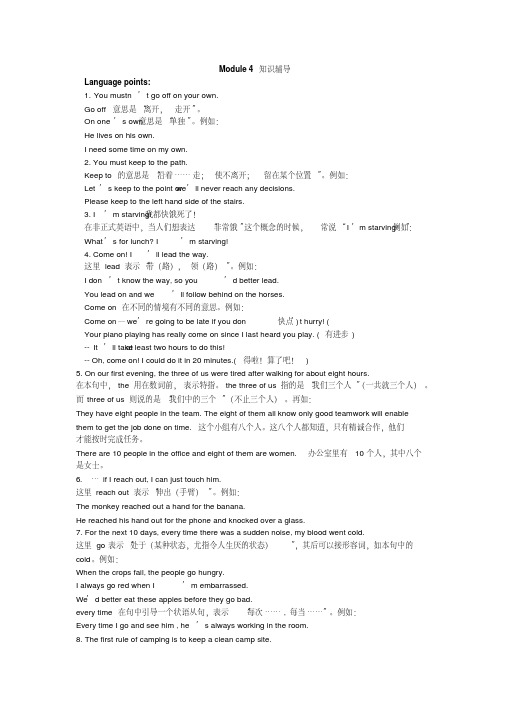
Module 4 知识辅导Language points:1. You mustn’t go off on your own.Go off 意思是“离开,走开”。
On one’s own 意思是“单独”。
例如:He lives on his own.I need some time on my own.2. You must keep to the path.Keep to 的意思是“沿着……走;使不离开;留在某个位置”。
例如:Let’s keep to the point or we’ll never reach any decisions.Please keep to the left hand side of the stairs.我都快饿死了!3. I’m starving!在非正式英语中,当人们想表达“非常饿”这个概念的时候,常说“I’m starving!”例如:What’s for lunch? I’m starving!4. Come on! I’ll lead the way.这里lead 表示“带(路),领(路)”。
例如:I don’t know the way, so you’d better lead.You lead on and we’ll follow behind on the horses.Come on 在不同的情境有不同的意思。
例如:快点)Come on—we’re going to be late if you don’t hurry! (Your piano playing has really come on since I last heard you play. (有进步)at least two hours to do this!-- It’ll take-- Oh, come on! I could do it in 20 minutes.(得啦!算了吧!)5. On our first evening, the three of us were tired after walking for about eight hours.在本句中,the 用在数词前,表示特指。
九年级英语情态动词完整归纳

九年级英语情态动词完整归纳一、初中英语情态动词1.—I take the magazine out of the reading room?—I'm sorry you.A. Could; couldn'tB. Must; couldn'tC. Will; can*tD. May; can't【答案】D【解析】【分析】句意:一一我可以把杂志带出阅览室吗?一一对不起,你不能.could 能,可以;must必须:w川将:may可以;can能,可以,can't不可以,不能.此处表示请求许可,用could或者may,由could或者may构成的一般疑问句,肯定答复用yes,主语+can,否认答复用sorry,主语+can't,结合选项,故答案选D“【点评】考查情态动词的辨析.注意理解句意,理解选项,根据语境,选出正确的答案.2.—Life is becoming convenient with the Internet.—That's true! Almost everything be done online.A. mustB. couldC. shouldD. can't【答案】B【解析】【分析】句意:一一生活正随着网络变得方便.一一那是真的.几乎所有的事情可以在网上完成.A 必须,B 可以,C 将,D 不能.Life is becoming convenient with the Internet.生活正随着网络变得方便,可知应该是很多事情可以在网上完成,应选【点评】考查情态动词.注意理解和掌握情态动词的不同用法.3.Look at the sign! It says “No Smoking!〞 You smoke here. It's dangerous.A. mustn'tB. ought not toC. needn'tD. don't have to【答案】A【解析】【分析】句意:看这个标志!上面写道"禁止吸烟!"你不能抽烟.这是危险的.A.mustn't 禁止,不允许;B.ought not to 不应该,不应当;C.needn't 不必;D.don't have to 不必.根据“N.Smoking!〞可知此处禁止吸烟,故答案为A.【点评】考查情态动词.掌握情态动词的意义和用法.4.Teenagers_allowed to drive .A. should not beB. should be notC. not should be【答案】A【解析】【分析】句意:年轻人不应该被允许驾车.Should是情态动词,其否认表达一般在在后面加副词not,应选A.【点评】此题考查含有情态动词的被动语态的否认形式.平时注意记忆情态动词的记忆和用法.5.—Where is Mom now?—I'm not sure. She be in the kitchen.A. shallB. mayC. needD. must【答案】B【解析】【分析】句意:一妈妈现在在哪里?一我不确定,她也许在厨房.A. shall将要:B. may 可以,可能:C. need需要;D. must必须,一定:根据I'm not sure可知是不确定:应选B»【点评】此题考查情态动词表推测的用法.6.—Who it be that is knocking at the door?—It be father, but I'm not sure.A. call; mustB. can; mayC. must; canD. may; must【答案】B【解析】【分析】句意:一一敲门的人可能是谁呢?一一他可能是父亲,但是我不确定. 第一空,can可能,表猜想用语疑问句形式,may是表可能;第二空,根据后面的but I'm not sure,可知表示不确定的猜想,应填may,应选B.【点评】此题考查情态动词辨析.先弄清每个情态动词的使用规那么.根据上下文的联系确定情态动词的使用.7.— I wonder if this smart phone is Mary's.— It belong to her. is totally different from this one.A. mustn't; HerB. can't; Her c. can't; Hers D. may; Hers 【答案】c【解析】【分析】句意:一一我想知道这个智能机是否是玛丽的.一一不可能属于她,她的和这个完全不同.情态动词表示推测时,用must表示"一定〞,用might, could表示“可能〞,用can't 表示"不可能".从句意看,这与她的完全不同,故不可能是她的,前面用can't o形容词性的物主代词后一定有一个被修饰的名词,名词性的物主代词后没有被其修饰的词,此题后没有被修饰的词,用名词性的物主代词,“她的":hers.应选C.8.As middle school students, we _follow the public rules wherever we go.A. wouldB. shouldC. mightD. could【答案】B【解析】【分析】句意:作为中学生,无论走到哪里我们应该遵守公共规章制度.would 将会,指将会发生的事情:should,应该,主要用于告诉某人应该做什么、给予忠告或加强语气.might,可能,事情发生的可能性:could,能,表示委婉语气;此处表示应该做的事情,应选B.【点评】此题考查情态动词辨析.根据上下文的联系确定所使用的情态动词.9.—He be in the classroomj think.—No, he be in the classroom. I saw him go home a minute ago.A. can; may notB. must; may notC. may; mustn'tD. may: can't【答案】D【解析】【分析】句意:一一我认为他可能在教室里.一一不,他肯定没有在教室里,我刚才看到他回家了.must,can (could) ,may (might)可以表示猜想,must表示肯定猜想,用于肯定句,肯定……一定……:can't表示否认猜想,肯定不......................... 另外can ( could ) ,may (might),表示可能性猜想,可能......根据I think,可知把握较小,根据I saw him go home a minute ago.可知第二句把握大,应选D.10.Shall we meet at the station at 7 am?---- In fact, we. The train until 9 a. m.A. mustn't; doesn't leaveB. mustn't; leavesC. needn't; won't leaveD. needn't; will leave【答案】C【解析】【分析】need,需要,否认式是needn't: must的含义是必须一定,其否认形式mustn't 表示禁止的含义.句意:我们上午七点在车站见而好吗?一一实际上,我们不必. 火车到上午九点钟才出发.结合语境可知后一空描述的是将要发生的动作,故用一般将来时态.选C.【点评】情态动词的考查是初中英语考查的重点,平时学习中一定要熟记这些词的根本词义及用法上的不同,注意其用法及在句子中表达语气的不同.测试中结合语境选择适宜答案.11.—you play tennis?—Yes, and I'm a good player.A. CanB. MayC. MustD. Should【答案】A【解析】【分析】句意:一一你会打网球吗?一一会,我是一名优秀的网球员.Can能,表示水平;may可以,表示允许;must必须,表示要求:should应该,表示建议;结合句意,此处表示水平,故用情态动词can,应选A.【点评】此题考查情态动词的用法.12.—Wow....another gift! What's in the box?—I'm not sure. It be a pair of sports shoes.A. mustB. mayC. will【答案】B【解析】【分析】句意:一一哇哦,另一个礼物!在盒子里面的是什么?一一我不确定, 它可能是一双运动鞋.A. must必须;B. may可能,表示没有把握的肯定推测:C. will将会.根据答语中的不确定可知这里应为可能,故答案为B.【点评】考查情态动词.掌握情态动词may表示推测的用法.13.—I think we need to sit down and have a talk. —I _________ agree more. Let*s take the bench over there.A. couldB. couldn'tC. shouldD. shouldn't【答案】B【解析】【分析】试题分析:句意:一一我认为我们需要坐下来谈一谈.一一我完全同意.我们到那边凳子上坐© I could agree more我可以同意更多的,I couldrVt agree我不同意I couldn't agree more,我完全同意I should agree more.应该同意更多,I shouldrVt agree more 我不应该同意更多.后句Let's take the bench over there.我们在那边的凳子上坐吧〕可以推测出,我同意,应选B'j14.You are supposed to bow when you meet someone from Korea.A. mustB. shouldC. wouldD. can【答案】B【解析】【分析】句意:当你遇到来自韩国的人时,你应该鞠躬.A. must必须,强调主观上的愿望;B. should应该,表示责任与义务:C. would要,将要:D. can能,会,表示能力.Be supposed to 表示"应该",应选B.【点评】此题考查情态动词词义辨析,以及must、should, would、can四个情态动词的词义和用法.15.Size and type do not matter — you do almost anything if you never give up.A. shouldB. mustC. needD. can【答案】D【解析】【分析】句意:大小和类型不重要一一如果你不放弃,你几乎可以做任何事.A. should 应该:B. must 必须;C. need 需要;D. can 可以,能:根据if you never give up,可知此处说你能做几乎任何事情,应选D.【点评】此题考查情态动词辨析.根据上下文的联系确定所使用的情态动词.16.—Some people don*t show their talents at the very beginning.—I agree. Even Einstein read until he was seven.A. can'tB. mustn'tC. couldn'tD. needn't【答案】c【解析】【分析】句意:一一一些人在一开始的时候没有表现处自己的才能.一一我同意.甚至爱迪生直到七岁时才会读书G can't不能:mustn^ 一定不会,禁止:couldn't不能:needn'to not...until...,直至U 才根据Some people don't show their talents at the very beginning.可知此处指爱迪生7岁才会读书,指才能,能做某事,根据he was seven ,可知句子时态是过去时,应选C. 【点评】此题考查情态动词辨析.根据上下文的联系确定句中所使用的情态动词.17.Harry's been driving all day --------he be tired.A. needB. canC. shallD. must【答案】D【解析】【分析】句意:哈利已经开了一整天车了一一他一定累了.根据句意可知,开了一整天车,所以推测他累是一定的.所以用情态动词must.应选D,18.—Kate, it's midnight! Why stay up so late?—I'd like to go to bed earlier, but the test paper ____ be handed in tomorrow morning.A. mayB. shouldC. canD. must【答案】D【解析】【分析】句意:Kate,都半夜了,你为什么熬夜到这么晚?我想要早一点睡觉, 但是这个试卷明天早上必须交上.may〞可以";should"应该":can"能,会,可能〞;must〞必须“.根据句意Kate熬夜到很晚,说明试卷明天必须交上,语气非常强,故应选D.【点评】考查情态动词辨析,区分may, should, can, must的含义和用法.19.—Is that boy Scott?—No, it _ be Scott. Scott is much taller.A. canB. can'tC. mustn't【答案】B【解析】【分析】句意:一一那个男孩是Scott吗?一一不,他不可能是Scott.. Scott个字高很多.A可能、可以:B不可能:C禁止.根据题干中Scott is much taller.可知斯科特更高,所以那个男孩不可能是斯科特,如表示对现在情况的否认推测,应用can"动词原形,故答案选B.【点评】考查情态动词,注意平时识记其用法,理解句意.20.The girl in the classroom be Mary. She called me from Beijing just now.A. mustn'tB. needn'tC. shouldn'tD. can't【答案】D【解析】【分析】句意:教室里的女孩不可能是玛丽.她刚刚从北京给我打的.A.不准,不允许,禁止;B.不必;C.不应该;D.不可能.后句句意可以堆测出玛丽不在教室,表示否定的推测,不可能,应选D.21.— Is that Mr. Green?—Impossible. He has gone to America. It_be him.A. couldB. mustC. can'tD. might【答案】c【解析】【分析】句意:一一那是格林先生吗?一一不可能,他去美国了.不可能是他. A.could可能,表示对目前情况作的可能的推测;可以,表示委婉的语气:B. must必须, 强调主观的愿望;一定,表示对目前作的肯定推测:C. can't不能,表示水平:不可能,表示否认的推测;D. might可能,表示可能的推测.根据句意,他去美国了,所以那不可能是格林先生.应选C.22.— What's the matter with Tom? He's been absent for two days.—Oh! He be ill. Let*s go and see him.A. needB. mightC. mustD. should【答案】c【解析】【分析】句意:一一汤姆怎么了?他已经缺席两天了.一一哦!他可能病了.我们去看看他吧.need需要,指有必要:might可能,表示推测语气,可能性很小:must 一定,表肯定推测:should应该,表建议.根据Let's go and see him.,可知推测汤姆生病了,去看看汤姆,表示肯定的推测,用must,应选C.【点评】考查情态动词辨析.根据上下文的联系确定所使用的情态动词.23.I'm sorry I_go now. My piano lesson will start in ten minutes.A. mustB. mightC. canD. could【答案】A【解析】【分析】句意:对不起,我得走:了.我的钢琴课十分钟后开始.A必须,表示责任:B可以,表示建议;C能够,表示水平或许可:D能够,表示许可.根据题干中的My piano lesson will start in ten minutes.提示可知,此句表示必须走了,应选A.【点评】考查情态动词的辨析.弄清每个情态动词的根本含义及用法,根据上下文语境确定正确的答案.24.—Must I go out to have dinner with you, Mum?—No, you ___ , my dear. You're free to make your own decision.A. shouldn'tB. mustn'tC. needn'tD. can't【答案】C【解析】【分析】句意:一一妈妈,我必须跟你出去吃饭吗?一一不,你不必,亲爱的. 你可以自由作出你的决定.问句是must构成的一般疑问句,根据no,可知是否认答复, must的否认回容许会使用needn'3故答案是C.【点评】考查情态动词neednl的用法,注意must构成的一般疑问句的否认答复.25.Please don't make so much noise. I hear the speaker very well.【答案】B【解析】【分析】句意:请不要发出那么多噪音.我不能很好地听清楚发言者的话. needn't 不必;cant 不能;shouldn't 不应该;mustn't 禁止.根据前半句的Please don't make so much noise.可知别人发出了太多噪音,所以他无法听见演讲者的话,故用情态动词 can'te 应选 Bo【点评】考查情态动词,结合句意和词义做出判断.26. Mr. Zhang has gone to Mexico, so the man be him.A. mustB. mightC. can't【答案】c【解析】【分析】句意:张先生去了墨西哥,所以那个男人不可能是他.A : must 一定, 表示推测:B : might 可能;C : can't 不可能,推测的否认.根据上文Mr. Zhang has gone to Mexico 可知那个男人不可能是他.表示否认的推测,要用cant,应选C .【点评】考查情态动词的辨析.根据语境选择正确的情态动词. 27. According to the law, traffic keep to the left in England.A. mayB. mustC. needD. can【答案】B【解析】【分析】句意:根据法律规定,在英国车辆必须靠左形式.A.may 可以,表示允 许:B.must 必须,表示要求:Cneed 需要,表示必要性:D.can 能,表示水平.根据 According to the law,可知法律的要求,应是必须的,应用must,故答案为B .【点评】考查情态动词.掌握情态动词的常用法. 28. —Look, Jim is talking to his friend under the tree.—It be him. He has back to Canada.A. can't; goneB. can't; beenC. may not; beenD. mustn't; gone【答案】A【解析】【分析】考查情态动词表推测及现在完成时的用法.一方面,表示推测语气时, carft 意为"不可能";may not 意为"可能不是";must 不用于否认句:另一方面,"have/has gone to+地点〞意为"去了某地",表示不在说话人这儿:"have/has been to +地点〞表示"去过 某地".句意为"一一看,吉姆和他朋友在树下谈话.一一不可能是他.他己经回加拿大 了「应选A . 29. If you the book, you buy it right now, I think.【答案】c A. needn't; needn'tC. don't need; needn't B. don't need; don*t needD. don't need; needn't to【解析】【分析】句意:如果你不需要这本书,我觉得现在你就没有必要买它.needn't是情态动词need的否认形式,后而跟动词原形:don't need是实意动词need的否认形式, 后面跟to do sth,或者名词做宾语,根据句意可知应选Co30.—Sic you use your mobile phone at the gas station. It's very dangerous.—Sorry, I will put it out soon.A. mustn'tB. don't have toC. needn'tD. may not【答案】A【解析】【分析】句意:一一先生,你不能在加油站用,太危险了.一一对不起,我很快就会把它挂掉.A禁止,B不必,C不必,D可能不,根据It's very dangerous,可知是禁止,应选A.【点评】考查情态动词,注意根据ItK very dangerous的语境选择用法.31.—Hi, madam. Can I take the story books out?-No, my boy. They be taken out of the reading-room. It's a rule.A. mustn'tB. needn'tC. couldn'tD. wouldn't【答案】A【解析】【分析】句意:一嗨,夫人,我能把这些故事书拿出去吗?一不,孩子,他们不可以被带出阅览室,这是制度.A. mustn*t不可以,禁止:B. needn't不必;C. couldnt不可能:D. wouldn't将不会.根据心a rule,可知这是制度,所以你不可以把这些书带出去, mustn't不可以,禁止,故答案选A,【点评】考查情态动词,表示禁止应使用mustn332.— Shall I book some seats for the concert?—・ I've done that.A. Yes, you mayB. No, you mustn'tC. No, you needn*tD. No, you can't【答案】c【解析】【分析】Yes, you may是的,你可以:No, you mustn't不,你千万不要:No, you needn't不,你不必:No, you can't不,你不能.句意:我要预定一些音乐会的座位吗?根据下文,我已经办了.可知选C最符合语境.【点评】考查交际用语33.He work on the farm every day. I'm sure about that because his skin is very black.A. can'tB. mayC. mustD. couldn't【答案】c【解析】【分析】句意:他一定每天在农场工作,我敢肯定,由于他的皮肤很黑.A. can't 不可能,对事情表示否认推测;B.may可以,可能:C.must一定、必须,表示非常肯定的推测:D. couldn't 不能.根据I'm sure about that because his skin is very black,可知他是在农场上工作,此处表示肯定的推测,应选C.【点评】此题考查情态动词.要掌握每个情态动词的使用方法.34.—Must I practice the violin right now?—No, you・ You do it later on.A. mustn't; mayB. shouldn't; mightC. needn*t; mayD. needn't; must【答案】c【解析】【分析】句意:一我必须马上练习钢琴吗?一不,你不必.你可以等会儿练. mustn't:不准,不允许,禁止:shouldn't不应该:needn't不必:前句问"必须吗?"答复:不必:needn't;后句话“你可以等会儿练",是表示许可的,may可以:must必须;might 可以.might为may的过去式,此处用现在,应选C.【点评】此题考查情态动词的词义辨析.以及must、need、should、need、might、may几个词的词义和用法35.—Look! The man welcoming us at the school gate be our headmaster.- No, it ____ b e him. He is having a meeting in the office now.A. must; can'tB. must; mustn'tC. can't; mustn'tD. mustn't; can 【答案】A【解析】【分析】句意:一一看,在学校门口欢送我们的一定是我们的班主任.一一不, 不可能是他.现在他正在办公室开会.must一定,表示肯定推测;carVt不可能,表示否认推测:mustn't 禁止,不表示推测:can 可能.根据He is having a meeting in the office now. 可知班主任正在开会,所以不可能是班主任,所以第二个空用can匕根据no可知第一个人认为正在欢送我们的一定是班主任,所以用must,应选A.【点评】考查情态动词,注意平时识记,理解句意.。
英语人教版九年级全册情态动词和被动语态
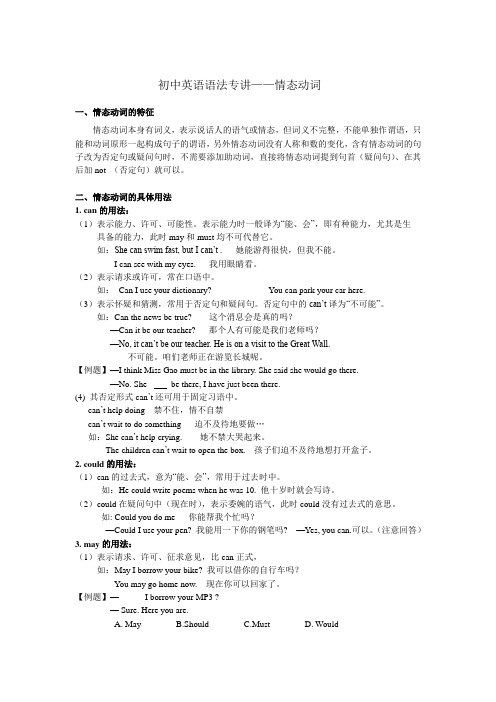
初中英语语法专讲——情态动词一、情态动词的特征情态动词本身有词义,表示说话人的语气或情态,但词义不完整,不能单独作谓语,只能和动词原形一起构成句子的谓语,另外情态动词没有人称和数的变化,含有情态动词的句子改为否定句或疑问句时,不需要添加助动词,直接将情态动词提到句首(疑问句)、在其后加not (否定句)就可以。
二、情态动词的具体用法1. can的用法:(1)表示能力、许可、可能性。
表示能力时一般译为“能、会”,即有种能力,尤其是生具备的能力,此时may和must均不可代替它。
如:She can swim fast, but I can’t . 她能游得很快,但我不能。
I can see with my eyes. 我用眼睛看。
(2)表示请求或许可,常在口语中。
如:Can I use your dictionary? You can park your car here.(3)表示怀疑和猜测,常用于否定句和疑问句。
否定句中的can’t译为“不可能”。
如:Can the news be true? 这个消息会是真的吗?—Can it be our teacher? 那个人有可能是我们老师吗?—No, it can’t be our teacher. He is on a visit to the Great Wall.不可能。
咱们老师正在游览长城呢。
【例题】—I think Miss Gao must be in the library. She said she would go there.—No. She _ _be there, I have just been there.(4) 其否定形式can’t还可用于固定习语中。
can’t help doing 禁不住,情不自禁can’t wait to do something 迫不及待地要做…如:She can’t help crying. 她不禁大哭起来。
九年级上册unit8Grammar情态动词表推测

been working for an hour.
A. must not B. won’t
C. can’t
D. may not
大家好
4. — Is John coming by train?
— He should, but he _____ not. He
likes driving his car.
A. must
B. can
C. need
D. may
大家好
THANKS
大家好
结束
大家好
D. can
大家好
2. — Isn’t that Ann’s husband over
there?
— No, it _____ be him — I’m
sure he doesn’t wear glasses.
A. can’t
B. must not
C. won’t D. may not
大家好
3. You ____ be tired — you’ve only
Gra
1
一、肯定推测
• 1、must • 表示肯定推测,意思是“一定、准是”。只能用于
肯定句。 He must know the answer. 他肯定知道答案。
大家好
should
• 用于肯定句,语气次之,意为“应该”,指按常理推 测。
• They left yesterday,they should be home now. • 他们昨天就离开了,现在应该到家了。
大家好
could might
• 也可表示推测,常用于过去时态; • 但在某些场合下,为了使语气更缓和,更委婉,常用
could\might代替can和may
九年级英语情态动词用法

情态动词用法I.情态助动词的特征1)除ought和used以外,其他情态动词后面只能动词原形。
We used to grow beautiful roses.I asked if he would e and repair my television set.2)情态助动词用于第三人称单数现在时的时候,没有词形变化,即其词尾无-s形式:She dare not say what she thinks.II.情态助动词的意义和用法1)can和could的用法1.表示能力或客观可能性,还可以表示请求和允许。
如:Can you finish this work tonight?Man cannot live without air.—Can I go now? — Yes, you can.注意:①could也可表示请求,预期委婉,主要用于疑问句,不可用于肯定句,答语应用can(即could不能用于现在时态的简略答语中)。
如:Could I e to see you tomorrow?Yes, you can. (否定答语可用No, I’m afraid not.)②can表示能力时,还可用be able to代替。
如:I’ll not be able to e this afternoon.2.表示惊异、怀疑、不相信的态度。
(主要用在否定句、疑问句或惊叹句中)Can this be true?How can you be so careless!This cannot be done by him.3.“can(could) + have + 过去分词”的疑问或否定形式表示对过去发生的行为怀疑或不肯定。
如:He cannothave been to that town.Can he have got the book?2) may和might的用法1.表示许可。
表示请求、允许时,might比may的语气更委婉一些,否定回答时要用mustn’t表示“不可以”、“禁止”、“阻止”之意。
常见情态动词最全总结
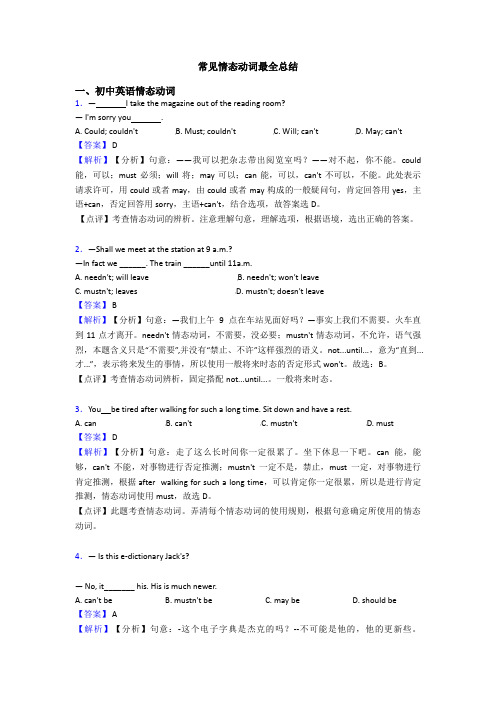
常见情态动词最全总结一、初中英语情态动词1.— I take the magazine out of the reading room?— I'm sorry you .A. Could; couldn'tB. Must; couldn'tC. Will; can'tD. May; can't【答案】 D【解析】【分析】句意:——我可以把杂志带出阅览室吗?——对不起,你不能。
could 能,可以;must必须;will将;may可以;can能,可以,can't不可以,不能。
此处表示请求许可,用could或者may,由could或者may构成的一般疑问句,肯定回答用yes,主语+can,否定回答用sorry,主语+can't,结合选项,故答案选D。
【点评】考查情态动词的辨析。
注意理解句意,理解选项,根据语境,选出正确的答案。
2.—Shall we meet at the station at 9 a.m.?—In fact we ______. The train ______until 11a.m.A. needn't; will leaveB. needn't; won't leaveC. mustn't; leavesD. mustn't; doesn't leave【答案】 B【解析】【分析】句意:—我们上午9点在车站见面好吗?—事实上我们不需要。
火车直到11点才离开。
needn't情态动词,不需要,没必要;mustn't情态动词,不允许,语气强烈,本题含义只是“不需要”,并没有“禁止、不许”这样强烈的语义。
not...until...,意为“直到...才...”,表示将来发生的事情,所以使用一般将来时态的否定形式won't。
故选:B。
【点评】考查情态动词辨析,固定搭配not...until...。
初中英语情态动词讲解-练习及答案
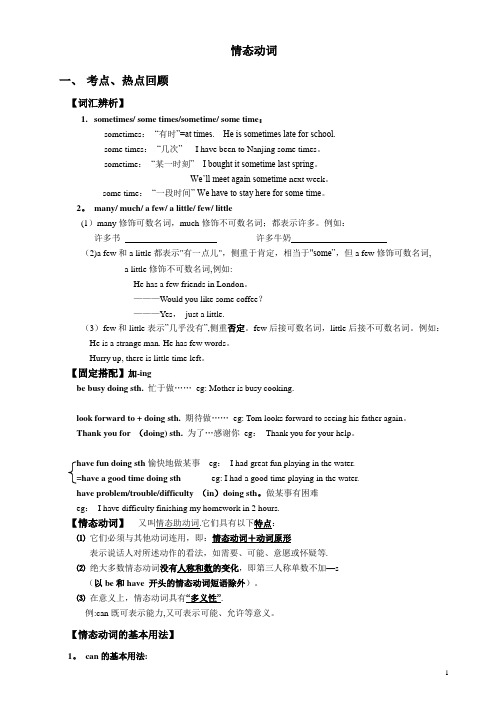
情态动词一、考点、热点回顾【词汇辨析】1.sometimes/ some times/sometime/ some time:sometimes:“有时”=at times. He is sometimes late for school.some times:“几次” I have been to Nanjing some times。
sometime:“某一时刻” I bought it sometime last spring。
We’ll meet again sometime next week。
some time:“一段时间” We have to stay here for some time。
2。
many/ much/ a few/ a little/ few/ little(1)many修饰可数名词,much修饰不可数名词;都表示许多。
例如:许多书许多牛奶(2)a few和a little都表示"有一点儿",侧重于肯定,相当于"some”,但a few修饰可数名词,a little修饰不可数名词,例如:He has a few friends in London。
———Would you like some coffee?———Yes,just a little.(3)few和little表示”几乎没有”,侧重否定。
few后接可数名词,little后接不可数名词。
例如:He is a strange man. He has few words。
Hurry up, there is little time left。
【固定搭配】加-ingbe busy doing sth.忙于做……eg: Mother is busy cooking.look forward to + doing sth. 期待做……eg: Tom looks forward to seeing his father again。
- 1、下载文档前请自行甄别文档内容的完整性,平台不提供额外的编辑、内容补充、找答案等附加服务。
- 2、"仅部分预览"的文档,不可在线预览部分如存在完整性等问题,可反馈申请退款(可完整预览的文档不适用该条件!)。
- 3、如文档侵犯您的权益,请联系客服反馈,我们会尽快为您处理(人工客服工作时间:9:00-18:30)。
6
would, should为will,shall 的过去式,would用于现在时 ,表示委婉提出请求、建议或看法,如Would you please not do it again? should还有“应该”的意思,但语气比 must 弱。
would 1)will的过去式,表示过去时间的“意志、意愿”。 They would not let him in because he was poorly dressed. 他 们不让他进去因为他衣着破旧。 I said I would do anyth)would用于现在时间,表示比较委婉地提出请求、建议或 看法。 Would you like another glass of beer? 再来杯啤 酒好吗?
考点揭密
3 掌握常用情态动can, could, may, might, must, need, shall, will, should, would等的用法。 can can 可表示能力、允许、可能性、怀疑猜测,意为“能, 会,可以”;can't意为“不会,不能,不可以”,还有 “不可能”之意。could为can的过去式,用法与can类似 ,常用于过去时中;could还可用于现在时中表示委婉客 气,相当于can;could也可表示惊讶怀疑,不相信,如: He couldn't be a thief.
复习
情态动词
考点揭密
1 2 掌握情态动词的定义:表示可能、怀疑、允诺、愿望、义 务、必要、猜测等的动词是情态动词。 掌握情态动词的语法特征 1) 情态动词不能表示正在发生或已经发生的事情,只 表示期待或估计某事的发生。 2) 情态动词 除ought to do和have to do 外,其它 情态动词之后只能接动词原形。 3) 情态动词没有人称,数的变化,即情态动词第三人 称单数不加-s。 4) 情态动词没有非谓语形式,即没有不定式,分词, 等形式。
考点揭密
may
2
may表示允许、也许,意为“可以,也许,可能”。 对May I ……?一般问句的回答,肯定回答一般是:Yes, please./Certainly./ Sure等;否定回答一般是:Please don't./No,you can't/mustn't. might是may的过去式,与may用法类似,常用于过去时 中;用在疑问句中,还可表示委婉客气。
考点揭密
2. may (might) 1)表允许,询问或说明一件事可不可以做,might指过去时间;但在疑 问句中might也可指现在时间,语气比may更委婉。 May (Might) I ask for a photo of your baby? 我可以要一张你宝宝的照 片吗? 在回答以may引起的问句时,肯定回答是一般可仍用may,或 Yes, please. / Certainly./Sure./Of course. ; 否定回答根据说话人的语气由强到弱分别选用: must not(mustn’t)(禁止) / had better not(最好别)/ may not(不行) 2) may表可能,但所表示的可能性不如can所表示的那样肯定。might可以 指过去时间,也可以指现在时间,但语气更加不肯定。 He may be at home. 他可能在家。 They might be having a meeting, but I’m not sure. 他们有可能在开会, 不过我不肯定。
重难点解析
1
怎样选用can和may 情态动词can和may都能表示“可能性”。如: He may be right. 他可能对。 He can’t be right. 他不可能对。 那么,在表示可能性这个概念时,二者的区别是什么呢?
考点揭密
3
must must 表示必须要做的事,意为“必须,应该”。must一般 问句的否定回答用needn‘t或don’t have to,而不用mustn‘t, mustn’t意为“不可以,不能”,表禁止,不许可。另外, must还可表示有把握的推测,意为“一定、肯定”。 need need 作情态动词主要用于问句和否定句中,意为“必要 ”。need一般问句的肯定回答用 must,否定回答用 needn't,如:Need I do it right now?肯定回答:Yes, you must。否定回答:No, you needn't. need作行为动词,有 人称、数和时态的变化,后接动词要加to do不定式。
1
考点揭密
1.can (could主要指过去时间 ) 1) 表示人或物本身所具有的能力,意为“能,能够,会” : Two eyes can see more than one. / I can swim very well. 2) 表示可能(理论上或是逻辑判断上) He can’t (couldn’t) have enough money for a new car. 3) 表示允许: Can I have a look at your new pen? He asked whether he could take the book out of the reading-room. 4) 表示对现在动作或状态的猜测,主要用于否定句和疑问句中或感叹 句中: He can’t (couldn’t) be over sixty. 他不可能超过六十岁。 5)could表示比can更委婉客气的提出问题或陈述看法,指的是现在时 间。 Can (Could) you lend me a hand? 帮我一把好吗?
在回答以must开头的一般疑问句时, 否定式需用need not (needn’t),表示 “不必”的意思。如: — Must we hand in our exercises today? — Yes, you must. ( No, you needn’t)
4
考点揭密
5
shall, will用来征求对方意见,shall用于第一人称,will用 于第二人称,用来表示意愿;shall用于第二、第三人称, will用于第一人称。
